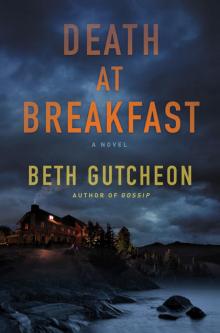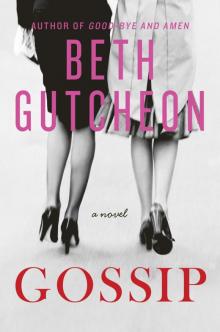- Home
- Beth Gutcheon
Dead at Breakfast Page 2
Dead at Breakfast Read online
Page 2
“You the manager?” the huge man roared. Gabriel could see that every stitch he was wearing was hand-tailored; they didn’t make clothes out of fabric like that at the Large and Tall shops.
“Manager slash general factotum. Gabriel Gurrell.” He offered the man his hand. The man ignored it.
“My secretary made reservations for me for dinner and the night and this idiot . . .”
“I’m so sorry, let me see if I can help.” Gabriel whisked behind the counter and took Cherry’s place at the computer. “Your name?”
The man slapped the driver’s license and gleaming black credit card that were lying on the desk.
After more tapping, Gabe looked up and asked, “Did she reserve by e-mail, Mr. Antippas? Or by telephone?” He had unluckily emphasized the first syllable of the name.
“It’s AnTIPPas, and how the hell do I know!” bellowed the man, so that even the Kleinkramers, far across the room, stopped their conversation and turned to look.
“I’m sorry for your inconvenience, and I’m sure I can accommodate you.”
“That’s what this idiot said, but she was wrong, weren’t you?” he turned to Cherry, who shrank back a step.
“Just tell me what you’re looking for.”
“I reserved a suite with a California king bed and separate sitting room, smoking, and another room for my sister-in-law, nonsmoking, and we want views of the lake.”
“I’m afraid all our rooms are nonsmoking, sir . . .”
“Well couldn’t you have fucking told me that when I reserved?” he yelled.
Gabriel’s eyes flicked toward the lounge. Had they all heard the F-bomb? By the look of the raised heads and startled-looking eyes all over the room, they had. Not what his clientele came to Oquossoc for.
After a moment he said, “It’s stated clearly on our website, sir, that we are a nonsmoking facility, but I understand your disappointment.”
“You think I have time to read your fucking website? Who owns this place, Mike Bloomberg?”
“I can offer you a very nice suite on the mountain side of the building, with a terrace you can smoke on. It’s just here,” said Gabriel, producing a map of the hotel and grounds and making an X with his pen.
“You think I drove for seven hours for a view of the fucking parking lot?”
The woman with the dog in her arms, presumably his wife, came to join him.
“Alex,” she said wearily, “I’m sure it’s fine.”
The huge man turned to look at her, as if to say you think it will be fine?
To Gabriel he snapped, “Is your supervisor here? Who can I talk to? How about the owner?”
Gabriel said, “I am the owner.” He was trying not to look as if he’d be glad if they just took their luggage and went out the way they came. In flush times, you could choose whom not to accommodate, but since the crash of ’08, he needed every bit of trade he could get and keep.
“Why don’t we just go up and have a look at the suite he’s got?” said Mrs. Antippas. “I’m tired, and Colette needs her dinner.”
“Yes of course,” Gabriel said. “I’ll phone the dining room and tell them you’ll need a table for three in what, fifteen minutes?”
“Colette is the dog,” said the second blond woman, who delivered this news, then returned to her woolgathering. Behind him Cherry was whispering a long self-justifying explanation of the problem she’d been trying to solve. Which involved the dog.
Gabriel seemed to refocus. The woman with the huge man had a dog in her arms.
“Ah. I see.” He went back to the computer, as the woman with the dog said with a warning note in her voice, “I read the website and it expressly said that this is a dog-friendly hotel.”
“Yes it is, madame,” said Gabriel. “But we are bound by health department rules. Dogs are only permitted in this wing here; we have guests who are allergic, and all animals have to be kept away from food service.”
“Don’t you clean the rooms between guests?”
Gabriel was close to losing it. “Yes of course we clean between guests,” he said through tight lips. “These are not my rules.”
“Then give us a suite in the dog wing.”
“I’m afraid I don’t have a suite in that wing, madame. I have only one room open there, and it has twin beds and no sitting room.”
“Do you mean there are no suites in that wing?”
“There are two, madame, but they are both occupied.”
“Well, tell someone they have to move to the one over the fucking parking lot,” said Antippas.
“I can’t do that, sir. They are booked for the week by people here for the cooking class.”
“The chef is giving a cooking class?” asked the sister-in-law, suddenly seeming to come back to earth.
“Well that takes the fucking cake,” bellowed Antippas. “I drove nine hours just to have dinner here, and I get to sleep over the parking lot and my wife has to kill her dog.”
“I’d like to know more about this cooking class,” said the sister-in-law.
“You’ll have to leave her in the car,” said Antippas to his wife.
The wife said to Gabriel, “You know what? It’s fine. I’ll sleep with my sister in the dog wing and my husband will take the suite with the balcony. Could you just take us to our rooms now? If I can’t get out of these panty hose soon and take a leak, I’m going to wet myself right here. Alex, get the dog’s suitcase and just shut up.”
“What did you just say to me?”
“The dog is not spending the night in the car. You sleep in the car, if you think that’s so nice.” Gabriel had summoned a bellman without seeming to move a muscle and in spite of his high dudgeon the man mountain had picked up a pet carrier bag and a large tote, in which Maggie could see a red leather leash, and a tiny Burberry plaid dog overcoat.
DAY TWO, MONDAY, OCTOBER 7
In the bracing cold of early morning light, Maggie joined a small group swaddled in fleece that had gathered in the parking lot to climb the mountain. Their guide would be Bonnie McCue, a “fitness professional” and member of the cooking class who was paying her way by offering hikes and exercise classes. Above them the windows of the mountain view rooms were draped in blackout curtains like rows of bandaged eyes. After seeing Alex Antippas in action in the lobby the night before, and again in the dining room, where there had been a fuss when he sent his truite en croûte back—twice—because the crumb inside the pastry was not up to his standards, no one wanted to disturb his slumbers, let alone risk seeing him in his nightclothes on his balcony.
Bonnie said in a near-whisper that they were going to do some stretches before taking off, and that a shepherd would bring up the rear so that no straggler would be lost on the mountain. Maggie looked in the direction she indicated and saw the little girl from the front desk last night, Cherry. She was in jeans and a sweatshirt with the hood over her hair and she hunched her thin shoulders as if she was bone cold. She must get combat pay to be here, Maggie thought. Surely not doing it for pleasure.
When they finished with their warm-up, Martin Maynard stripped off his fleeces, and after kissing his wife on the top of her head, he took off running. On his feet he was wearing something that looked like rubber socks with toes.
Bonnie looked after him, nonplussed.
“Don’t worry,” said Nina Maynard. “He does this wherever we go. He’s an Ironman.”
“They don’t really like the guests to go off by themselves unless they know the area.”
“He’s got a map. And a cell phone with GPS.”
“That’s fine, if he can get a signal,” said Bonnie, too late. Martin had disappeared into the trees above them. Bonnie squared her narrow shoulders and set off toward the mountain. Her little band fell in behind her and soon established their paces. Nina was right on Bonnie’s flank, her legs taut and strong, her arms pumping. Behind them, Albie Clark, wearing a wool cap and mittens and big earphones, made his solitary way.
�
�The cat who walks by himself,” said Teddy Bledsoe, an enthusiastic young man from San Francisco, gesturing toward Albie. He fell into step with Maggie. “Yes,” said Maggie. “I’ve dealt with parents like that, all sealed up in their own silos. You wonder what it is they’re keeping so close to the vest.”
“You’re a teacher, right?” Teddy asked.
“Former. And you’re a writer?”
“A food blogger. I grew up cooking and I thought I’d write a cookbook, but they’re over.”
“Cookbooks?”
“Yes. Now if you want to cook something you just pull up a recipe on the Internet.”
“How do you know the recipe is any good?”
“That’s where I come in. I’d give you my Web address, but good luck getting a signal here. I’m in withdrawal. You know those people in the dining room last night?”
No need at all to ask which people. In twelve short hours the new arrivals had managed one way or another to annoy almost everyone in the hotel.
“I swear I know who they are, it’s driving me crazy not to be able to Google them. It’s like having a phantom limb. Before I went to bed I heard the sister chewing on Mr. Gurrell, demanding to join the cooking class. He kept saying Chef Sarah closed the class months ago, and the sister said ‘Do you know who I am?’”
“I didn’t think people really said that,” Maggie remarked, stepping around some porcupine scat on the trail. “So what brought you all this way for this class? You must have plenty of food to write about in San Francisco.”
“Chef Sarah came from San Francisco. She used to cook at a little bistro out in the avenues. She made a lobster ice cream you could kill for. Kill.”
“I think that sounds completely disgusting.”
“It was a first course. People would taste it and swoon, you could hear them hitting the floor all over the dining room. I was crushed when she moved east.”
By the time Maggie had had her posthike shower and eaten breakfast, Teddy had been into town to Just Barb’s, which had a wi-fi hotspot, and returned with a wealth of Internet gossip and a copy of the Boston Herald.
And the two blond sisters had joined the cooking class.
Mr. Rexroth was in Gabriel’s office, spluttering in a rapid, pressured way that was frequently interrupted with explosions, like a car running rough with occasional backfires. His forehead was wrinkled with distress and his bald head had gone pink. He was wearing his summer uniform, a seersucker suit that had seen much better days.
“We met them in the hall last night and everything was fine, they seemed like lovely girls and Clarence sniffed and it sniffed and everyone wagged but then this morning just as I settled down to my sermon it started to yap and it yapped and that made Clarence howl and I don’t know I just don’t know, I can’t work with a racket like that and the text is from Jeremiah and you know what that’s like, I mean it’s hard enough and they’re up there this minute yapping and howling . . .”
“I’m so sorry this is happening, Mr. Rexroth. As you know we love our four-legged guests . . .”
“Yes but, yes but . . . is there no other place you could move them to? How long are they staying? I mean I can’t . . . I can’t . . .”
“I understand,” said Gabriel rather desperately. “You know what a valued friend of the Mountain Inn family you are. I don’t know what I can do this morning except to offer you another room to work in, but . . .”
“Can Clarence come with me?”
“As I was going to say, I don’t have another room open where we’re allowed to accommodate pets. As soon as I can I’ll try to arrange a trade with another guest.”
“I hope you have one who’s deaf as a fence post,” said Mr. Rexroth bitterly.
Gabriel had already thought of that and had no idea what he was going to do about it. There were a limited number of rooms where animals were allowed, all occupied, and the guests were out for the day. Except for Earl, the stable manager who had had an accident and fallen on very hard times. Gabriel allowed him to live in the smallest room in exchange for some light gardening and taking care of the horses. Earl had already been to Gabe’s office to mention how much the yapping in 6G was upsetting his parrot.
“I wonder if possibly Clarence could wait for you in the car, just for this morning? The weather is mild and we could—”
“In the car? Clarence? In the CAR? He did not start this, it’s that tarted-up little . . . he would feel he was being punished! And that’s not fair! Where is its mother?”
Gabriel wished with all his heart that its “mother” was at the bottom of Long Lake along with her huge fat bully of a husband, but if wishes were horses, beggars would ride.
“I promise I will speak to her as soon as she comes in. They swore that the dog never barks. Mr. Rexroth, would it help if I find someone to take Clarence on a good long walk this morning, while you get on with your work?”
Mr. Rexroth paused and flapped his arms as if to say no, that won’t work, but he couldn’t think of why it wouldn’t. “It would have to be someone Clarence knows. Clarence is particular.”
Gabriel suspected that like most people, Mr. Rexroth preferred almost anything to actually having to write, and was now inventing excuses. “Tell me who he likes.”
“He likes Chef Sarah,” said Mr. Rexroth. Of course he did. Sarah was a dog whisperer. She knew just where they most liked to be scratched, and she saved delicious table scraps for Clarence. But she couldn’t be asked to exercise the guests’ pets.
“I’m afraid she’s busy with her class this morning.”
A long pause. Mr. Rexroth said, “He let that little girl at the front desk pat him once.”
“Cherry Weaver?”
“The one with the hair like this.” He made a motion with his hands.
“I tell you what, she just came on duty. I’ll take over the desk for her and she can take Clarence for a walk along the lake. I’m sure she’d enjoy the exercise.”
Mr. Rexroth agreed, though as if with grave doubts, that that might solve the problem for the time being.
“Let’s go talk to Cherry, then,” said Gabriel. Just to make him look like a complete liar, the first person they saw coming toward them in the hall was Chef Sarah, with her handsome auburn hair pulled up in a bun, looking far from busy. There was something he wasn’t used to in her manner, though, as if she wasn’t feeling well, or had gotten bad news. She greeted Mr. Rexroth before saying, “Gabriel, could I have a word?”
He looked at her a little wild-eyed, thinking, Damn, I hope this isn’t about Cherry. Cherry’s mother worked for Sarah in the kitchen, and neither one was a woman you wanted to piss off. He said, “One thing at a time. Come see me in the lobby in ten minutes, could you?”
Sarah said, “Never mind. Come find me when you’re free.”
The cooking class was on a visit to a local apple orchard. Because they were now too many to fit in the hotel van, Hope and Maggie had volunteered to follow in Hope’s rental car. It was another gorgeous day, sweater weather but warm in the sunshine, and although it was early for the full autumn leaf panoply, there were blazes of scarlet and of bright ochre in the hardwood stands along the road.
At the orchard, the farmer, a young woman from Oregon who talked a good deal about “slow food,” had laid out samples of different varieties of heritage apples, neatly sliced and labeled Maiden Blush, Pound Sweet, St. Edmund’s Russet, and Whitney Crab. There were ten little notebooks and ten sharp pencils with the name of the farm on them ready for the class to make their “tasting notes,” as if they were sampling wine. Teddy Bledsoe and Margaux, who arrived last because they had detoured to see if the Concord grapes in the arbor were ripe, were taking their notes on the backs of deposit slips Margaux had found in her purse, since the flossy blond newcomers to the group betrayed no sense that it was they for whom no notebooks had been provided.
The taller of the blondes looked at the rather gnarled slice of the Whitney Crab apple she was holding. She showed it
to her sister and the corners of their pretty pillow-lipped mouths turned down.
“What is this black stuff,” the taller one asked the farmer. She held out her apple slice and pointed.
“Oh that—excuse me, what’s your name?”
“Glory.”
“That’s a little sooty blotch, Glory. It won’t hurt you.”
Glory had returned her untasted slice to the plate and was sorting through the rest to find one that was unblemished.
After the apple-tasting the farmer demonstrated the use of the cider press. Then the farmer’s husband gave them all samples of an organic apple sweetener he was trying to market as apple molasses, and ten of them were given paper sacks of apples in all the varieties they had tasted. Hope and Maggie offered to share a bag, and everyone was appreciative except Glory’s sister, who declined her bag, saying apples really weren’t her favorites.
Teddy caught up with Maggie and Hope. “Can I ride back with you? I’ve got to tell you what I learned in town.”
“Absolutely,” said Hope.
“Still no service,” Teddy said. “I found some amazing video . . . oh well.” He put the cell phone away again. “I knew they were ringing some bell in my reptile brain.”
“What is her name? Glory?” Hope asked.
Teddy didn’t seem to notice Hope’s driving, so intent was he on bringing the wonders of the Internet to them. He was in the backseat where there were no air bags, and didn’t even have his seat belt on.
“Her real name is Gloria. The other one is Melisande, known as Lisa.”
“Goodness, aren’t we literary.”
“They’re twins, but not identical. From Ontario. They were ‘it’ girls in Toronto for a while, and then Glory went to Hollywood. She had some parts in B movies and had a talk show on cable TV.”
“What about Lisa?”
“She went west too. They cut quite a swath. Some gossip column said they moved through the L.A. party scene like lionesses looking for zebra. All tanned, with big blond manes and matching boob jobs. Designers lent them clothes. David Yurman gave them jewelry. Their father is Victor Poole, do you know who he is?”

 The Affliction
The Affliction Dead at Breakfast
Dead at Breakfast Good-bye and Amen
Good-bye and Amen Leeway Cottage
Leeway Cottage Gossip
Gossip Saying Grace
Saying Grace